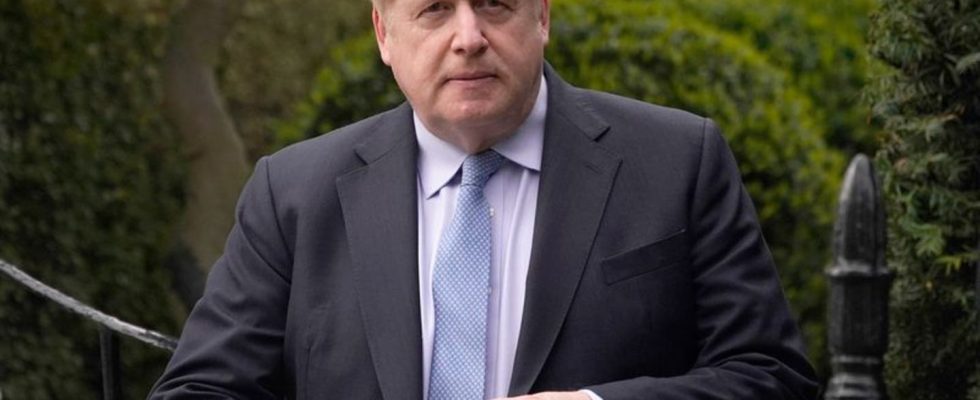Government
Johnson’s “Partygate” lies put PM Sunak under pressure
He doesn’t like parties, says a close friend over Boris Johnson’s photo
© Alberto Pezzali/AP/dpa
Britain’s Parliament decides whether to approve damning report on Boris Johnson’s lies in ‘Partygate’ scandal. But humiliation is unlikely.
British Prime Minister Rishi Sunak just can’t get rid of his conservative enemy Boris Johnson. It doesn’t matter which topics Sunak takes on and what he wants to talk about – the talk always comes back to the scandal-ridden former prime minister. The Guardian newspaper commented: “Johnson’s legacy haunts Sunak.”
On Monday, the ex-premier was once again in focus. On his 59th birthday of all days, the House of Commons in London debated a committee’s devastating report on the “Partygate” affair. Its conclusion: then-Prime Minister Johnson repeatedly lied to the House of Commons over the Downing Street lockdown celebrations scandal. In response, Johnson loudly berated the members of the committee, including several Conservative MPs. So far, Sunak has not publicly revealed what he thinks about it.
The ex-prime minister and his remaining comrades-in-arms are now quieter. According to the Sunday Times, Johnson himself wanted to spend the day with family and some friends at his Oxfordshire estate, which he recently bought for several million. “Ironically, he’s the last person to invite people to a party,” the paper quoted a “close friend” as saying. “He does not like her.” In fact, the birthday boy came full circle.
Another fateful birthday
Johnson’s birthday three years ago also turned out to be fateful. Because he celebrated with cake despite contact restrictions, he later received a fine from the police – as the first incumbent prime minister in British history. As it turned out, this was not an isolated incident: there was carousing and partying in government buildings while the country remained in lockdown.
But when pictures and eyewitness accounts became public, Johnson initially denied everything. All the rules had been followed, he claimed in Parliament. When that was no longer tenable, he stated that he had not heard anything about the celebrations. When it finally became clear that he himself had attended the party, he took the position that he had not realized that the celebrations were illegal. The committee didn’t believe him.
The debate was now about whether Parliament would adopt the findings of the investigation and impose sanctions on Johnson. Johnson forestalled a 90-day suspension recommended by the committee by resigning from office. However, he is still threatened with the withdrawal of his parliamentary ID card, which ex-MPs receive. Johnson had previously vilified the committee as a “kangaroo court”. He sees the investigation as a witch hunt by Brexit opponents and personal enemies.
Commenting on the findings, he said: “This is rubbish. It is a lie. In order to come to this insane conclusion, the committee has to say a number of things that are patently absurd or contradict the facts.”
The question remained whether the House of Commons would actually vote or whether the report would be accepted by acclamation. Johnson’s ally Simon Clarke had previously said he opposed the document. At the same time, he tweeted that there would be no vote.
Johnson called his men back. This is probably also due to the fact that there is a clear majority against him, because this time there was no group obligation. Many Tory MPs, including Johnson’s successor and Sunak’s predecessor, Liz Truss, are unlikely to even show up in the House of Commons.
Debate without the Prime Minister
Sunak also missed the debate. The House of Commons is not on his calendar, his spokesman said. At the same time, the Prime Minister received Swedish Prime Minister Ulf Kristersson. Sunak left open how he would vote in the event of a vote, even after multiple inquiries. “It is important that the government does not interfere because it is a matter for Parliament and MPs as individuals, not as members of government,” the PM said in an ITV interview.
Sunak’s caution is probably appropriate – even if opponents now accuse him of lack of leadership. Johnson has hardly any allies in the Tory faction, and according to a Yougov survey, the British as a whole no longer want to know much about the ex-prime minister. But the same poll also found that Johnson is still more popular with conservative voters than Sunak, whom many at the grassroots level blame for the populist’s demise. “How do you feel about Boris?” Should therefore be a crucial question for many Tory candidates with a view to the parliamentary elections planned for 2024.

